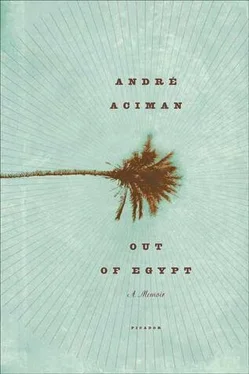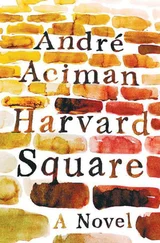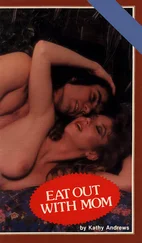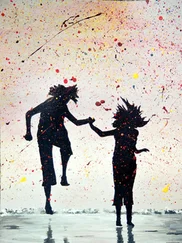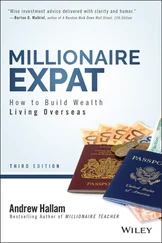A week later Nessim died. During the night following his operation, the sutures tore open and blood began to seep into his mattress, soaking the floor beneath. When Aunt Elsa, who was spending the night with him in his hospital room, awoke from a slumber, he was already gone.
“I wonder what the third blow will be,” said my grandmother a few days afterwards. “We don’t need many hints to guess that,” was my father’s reply.
On the morning when the news of Nessim’s death arrived, I awoke to a strange, persistent, owl-like hooting coming from the other end of the apartment. It had probably been going on for hours. I remembered trying to dispel it in my dreams. Finally, I slipped out of bed to see what it was. There were two nurses in the foyer, and with them Aunt Elsa, sobbing. She was seated on the sofa, still wearing her hat and clasping her handbag. She must have slumped down on the sofa as soon as she entered the apartment. Before her was an empty glass of what had undoubtedly been sugar-water. I tried to comfort her by caressing her arm. She didn’t seem to feel it, but when I stopped, she whimpered something inaudible that sounded like a plea. “Stay, stay,” she repeated, but I did not know whether she meant me or her brother. Then the hooting started again and she began saying things in Ladino, always repeating the same five or six words in a ritual intonation which I could not understand. Abdou was trying to make her drink some more; she kept refusing, turning to him and repeating the same words she had been saying to me. He answered her in Ladino, saying the señora was right, she was right, of course he had had plenty of life left in him, but fate willed otherwise, and who could question Allah. I shot him a quizzical look, wondering what she had been saying, and on our way back to the kitchen he explained, in Arabic, “She keeps saying he was only ninety-two, only ninety-two,” whereupon both of us burst out laughing, repeating “only ninety-two” as if it were the funniest mot de caractère in Molière. The joke spread to Zeinab, across the service entrance, who passed it on to the servants upstairs, and downstairs, down to the porter, to the grocer across the street, and who knew where else.
My grandmother’s reaction was no better. Upon seeing her sister seated half-dazed on the sofa, she immediately threw a tantrum. The two sisters hugged each other, and Aunt Elsa, whose tears had subsided by then, once again began to sob. “See what you’ve made me do,” she kept repeating, “I didn’t want to cry again, I didn’t want to cry.”
The sight was so moving, that I too would have sobbed along with them had I not bit my tongue and forced myself to think of other things, of funny things, anything. But as though guided by a perverse logic, my thoughts, however farfetched and bizarre, seemed determined to lead me back to poor Uncle Nessim, who, until two weeks ago, would sit in the family room busily refreshing his knowledge of spoken Hebrew because he wanted to die in Israel. There was nowhere to turn to forget. I tried to read in my room but could not. No one wanted to speak. Even the servants were unusually quiet. I would go to the kitchen and sit with Abdou and try to squeeze yet one more droplet of humor out of only ninety-two . But even that seemed stale now.
Uncle Nessim had lent me a nineteenth-century edition of Lord Chesterfield’s letters. He thought I should read them; all young men should, he said. A few days later, Aunt Elsa knocked at my door and asked for the book. It would be put together with his other things, she said. I don’t know how she found out I had it. But a few evenings later, when she was not home, I unlocked her bedroom door and rifled through her possessions, determined to rob her. Not only did I take back the Chesterfield, but I relieved her stamp collection of some of its rarest items. Many years later, while visiting her in Paris, I was helping her arrange her stamps in a new album when it finally occurred to her that she was missing her most valuable specimen. “These Arabs fleeced me well,” she complained, while I threw a complicit look at my grandmother, who, at the time, had found out about my expedition into her sister’s bedroom. This time, however, my grandmother returned an empty gaze. She had forgotten.
That evening, I slipped into Uncle Nessim’s bedroom. I sat on his bed, looking out the window, catching the flicker of city lights, remembering how he spoke of London and Paris, how he said that all gentlemen, of whom he fancied himself one, would have a glass of scotch whiskey every evening. “It will kill me one day,” he prophesied, “but I do love to sit here and watch the city and think about things for a while before dinnertime.” And now, I too would do the same, think about things , as he put it, think about leaving, and about all the people I would never see again, and about this city, so inseparable from who I was at that very instant, and how it would slip into time and become stranger than dreamland. That too would be like dying. To be dead meant that others could come into your room and sit and think about you. It meant that others could come into your room and never know it had once been yours. Little by little they would remove all traces of you. Even your smell would go. Then they’d even forget you had died.
I opened the window to let in the city noise. It came — though distant and untouched, like the laughter of passersby who don’t know someone’s ill upstairs. The only way to shake off this lifeless gloom was to go out again, or find a secluded corner somewhere and read Cousin Arnaut’s dirty books.
That night we all went to see the late-night showing of the new French film Thérèse Desqueyroux . It was the first time I had been to the theater at that hour, and I was immediately dazzled by this unfamiliar adult world, by its glamour and mystery, the whispered undertones during intermission, the spiffed-up young men two to three years older than I sitting with girls in the back rows, and the strange legend of perfume, mink, and cigarettes, that hovered about women like an elusive presage of love and laughter in crowded living rooms where they sat and talked with the men who loved them, as men and women talked in my parents’ living room when there was company and I had gone to bed.
Later we went to an expensive restaurant in the city, and when I asked whether we could afford it, my father looked amused and said something like, “Don’t worry, it isn’t as bad as all that.” We were with friends, and my grandmother and Aunt Elsa had come, and no one spoke of Nessim, and we ate with hearty appetites, and afterward, as was sometimes our habit, we drove along the Corniche, no one saying a word as we listened to the French broadcast until we stopped the car and got out to take a good whiff of the sea, listening to the bronchial wheezing of the waves as their advancing lines of spray clashed against the seawall.
That night the midnight caller called. Was everyone home? Yes, everyone was home. Where had we been? We’re in mourning, please, leave us alone. Where did you go, he insisted. “May a curse fall on the orifice that spawned you and your mother’s religion,” said my father and hung up.
The following day, returning from tennis, I was greeted by loud howling from the kitchen. My mother and my grandmother were quarreling at the top of their lungs, and Abdou, who normally took Sunday afternoons off, was busily trying to appease them both.
“Here are your damned prunes,” shouted my mother. “Damn yourself, damned ingrate,” retorted my grandmother, her voice cracking with emotion. “Who did you think I was trying to cook it for? For me?” The rest was sputtered in random fragments of Turkish, Ladino, and Greek.
Fearing for her sister, and despite her desire to remain impartial, Aunt Elsa tried to calm my grandmother and whispered something in Ladino, which sent my mother flying into a greater rage. “Always whispering, you two, with your cunning, beady, shifty, Jewish eyes, whispering your furtive little Ladino secrets like two ferrets from the ghetto of Constantinople, always siding with each other, the way she”—indicating my grandmother—“sided with you against her husband until she killed him like a dog, like a dog he died, wouldn’t even let her visit him in his hospital room when he died.” “What do you know, what? You good-for-nothing seamstress from Aleppo,” shouted Elsa now, openly joining the fray. “Aren’t you ashamed to speak like this while Nessim’s body is still warm with life?” “Nessim this, Nessim that,” tittered my mother. “He is well rid of you both. If you knew how he loathed you. Turned him into an alcoholic in his own bedroom, you did. Ha, don’t make me say any more. You killed him, both of you, just as you killed your husbands. Whose turn is it now? Mine, do you think?”
Читать дальше
